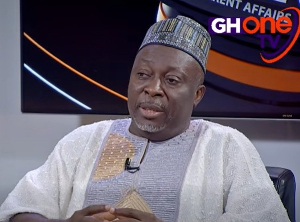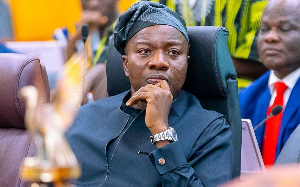In recent times Ghana has promoted itself as the gateway to Africa. In line with this the country has even established a one-stop institution known as the Ghana Gateway Services along with some modest and superficial changes across several government establishments. These changes regardless, it remains questionable whether key establishments required to play vital roles in this whole gateway idea can deliver.
One establishment that I have been thinking about is the Tema Harbor. Ghanaians and foreigners doing business in Ghana recognize the importance of the country’s ports to the on-going economic development efforts. The plain fact is that as the entry point for a disproportionate amount of imported industrial and personal goods coming to Ghana, the Tema harbor is unarguably a key element in Ghana’s gateway program. But based on my personal experiences along with anecdotal account from several compatriots in the USA, Canada, Britain along with importers and the expatriate community in Ghana, it is also clear to me that the Tema harbor is in a crisis. Before I continue I would like to put on record my sincere commendation for a section of port and custom officials who inspite of the abysmally low wages and demanding work conditions remain dedicated to their duties. At the same time I would also like to express my complete disappointment and repudiation for another cross section of port officials whose unprofessional behavior and opportunism have contributed to these sentiments that I am about to express below.
As a Ghanaian and also an investor in Ghana who has been importing industrial goods to Ghana through Tema harbor since 1990 my experiences at the Tema harbor overall, is a major disincentive towards doing business in Ghana. This sentiment is shared by several of my colleagues in the UK, Italy, USA, Canada and elsewhere who depend on inputs from abroad for their industries. In fact, my personal experiences at the Tema Harbor, along with anecdotal narratives from colleagues both in Ghana, America and Canada strongly suggest that massive transformations are required if the harbor is to play any role at all in Ghana’s attempt to assume the role of gateway to Africa.
I continue to find it so puzzling that the simple act of clearing imported goods from the Tema port is so daunting, unbearable and intimidating. I have come across importers and potential investors who have been discouraged by the unwieldy and tainted bureaucratic phases that are consequent to the customs and inspection requirements at the Tema harbor. By contrast, in major industrialized nations including the US, Canada and Germany, custom formalities for imported goods do not only take a few hours, in fact, it can be accomplished on the telephone. Surely, Ghana’s situation is a symptom of Ghana’s underdevelopment relative to industrial nations, but we should lament this poor state of affairs at the harbor since it is worsening even in these times when the country is self-promoting itself as the gateway to Africa.
For people who have been doing business with the Tema harbor, the reason why it is so difficult to clear goods at the Tema is not hard to identify. Prominent among these factors is ignorance of the formal procedures for clearing goods at the harbor. Woefully, such ignorance is widespread considering that no where at the port are the steps involved in the clearing of goods publicized. In course of the fifteen years that I have been doing business with the Tema port I have approached several Ghana Port Authority officials, clearing agents, functionaries of major shipping lines in Ghana seeking information on the various steps that importers have to negotiate to clear goods at the harbor. Not only have my attempts been unsuccessful, I am yet to meet a port or custom and excise official or a private clearing agent who has adequate grasp of the bureaucratic steps involve in the clearing of goods at the Tema port. It is possible that high level port officials may have documents outlying all the intricate steps for clearing goods at the Tema harbor, but this is beyond the purview of the general public or importers. Without a clear understanding of the steps involved, clearing goods at the Tema port has degenerated into a protracted and frightening process, so cumbersome, confusing, unwieldy and mystifying. Such a system is not only punitive; it is rather unprogressive in the present time when Ghana is desperately trying to reach out to investors. Given this situation, importers are placed at the mercy of clearing agents whose desperate attempt to earn a living coupled with a weak understanding of the procedures, improvised techniques and in most cases unprofessional approach only serve to worsen the plight of importers.
Making the Tema harbor better will not be easy or an overnight achievement, but there is much we can do if we are thoughtful and concerted in our efforts. I invite all Ghanaians particularly importers to think about what efforts might be appropriate for transforming the Tema harbor and to share their constructive thoughts with the Ghana Ports Authority, Ministry of Transportation and even the president—given his personal interest in transforming existing institutions. I also ask each of you to think about how you might contribute to this important task. One way that I recommend highly is maximizing exposure of both the good deeds and clear contravention of rules by port officers. Importers who recognize positive contributions by some of the dedicated port workers should be quick to praise them. At the same time, importers can also serve as watchdogs by reporting any unwarranted experience at the harbor to authorities or write an article expressing their dissatisfaction in the dailies or any of the FM stations. Those who wish to do so will find the Ghanaians media more than willing to help. What are some of the outrageous abuses of power by custom or port officials at the harbor that you think ought to appear in the newspapers? Please share those experiences and observations with the media.
Akwasi Antwi, USA
Opinions of Friday, 4 February 2011
Columnist: Antwi, Akwasi














